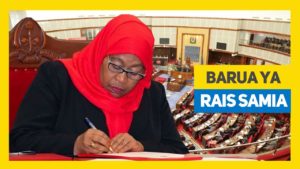by Ben Taylor
President Hassan marks 30 years of multipartyism with a public letter to Tanzanians
To mark the 30-year anniversary of Tanzania’s adoption of multiparty democracy in 1992, President Samia Suluhu Hassan took the unusual step of writing a “letter to Tanzanians”. This was published in several newspapers on July 1st.
Under the title “I am determined to bring about political, economic change”, the President noted that the work of fighting for democracy was not yet complete. She explained that Tanzania was currently facing the same difficulties that existed when the multiparty system was re-introduced. “This is why in my leadership I believe in the so-called 4Rs – Reconciliation, Resiliency, Reforms and Rebuilding,” she said.
“It is important to explain how we entered the system,” she wrote. “President Ali Hassan Mwinyi formed the Judge Francis Nyalali Commission which reported that only 20% of Tanzanians wanted the multiparty system. The wisdom of Mzee Mwinyi and his fellow leaders allowed the minority to hold sway. Had they waited until the majority wanted multiparty politics, we wouldn’t be where we are today. This is one of the biggest lessons for politicians of my generation and for future generations. That as far as national interests are concerned, knowledge and wisdom are more important than numbers.”
“Instead of only hearing one voice and, sometimes, of one person, as we used to say ‘Long live the ideas of the chairman’, now Tanzanians are exposed to various political ideas. Even Chairman Mao once said ‘Let a hundred flowers bloom.’”
This reference to a slogan that Mao himself later rejected in the most vociferous of ways was the first of two references that surprised many observers. The second was perhaps even more startling, though for a different reason:
“In a famous 19th century comic opera called Iolanthe,” she wrote, “the creators Arthur Sullivan and W. S. Gilbert said something interesting about the American nation during that time: ‘Everyone born is either a conservative child or a liberal child’.” The President took issue with this view: “I do not believe in such presuppositions.”
Obscure references aside, however, the letter proceeded to set out her bold and democratic ambitions for the country under her leadership. “In building a better Tanzania I aspire to create a society that lives in harmony and understanding. I wish to foster unity regardless of our political, religious or ethnic differences. This will only be possible by creating a society in which everyone enjoys equal rights before the law, where there is no discrimination and where there are equal economic opportunities for all. I believe reconciliation cannot be attained where there is discrimination and where some people are denied economic and civic rights.”
This rhetoric became more specific: “Reforms in electoral laws will create a level playing field in our politics and give the electorate an opportunity to elect the leaders they want. In the economy reforms will ensure that more people, as opposed to a few, benefit from economic opportunities.”
“I am aware that people cannot eat reconciliation, resilience or reforms. … [O]ur main goal should be economic growth. And the growth should be sustainable enough to create employment to our youth and open up opportunities to all social groups in the country.”
“I am confident that we will be able to fulfil the goals of having a multiparty system,” she concluded. “Our main objective was not to have a multitude of political parties but to build a resilient and patriotic society that values reconciliation, with sustainable economic growth that benefits all. This is the best way to honour all those who fought for multiparty politics in our country.”
The President’s letter was commended by some and criticised by others.
“This is a wonderful move,” said Zitto Kabwe, the ACT-Wazalendo party leader. However, he also called on the government to turn the words into actions: “we need to see these issues taken to Parliament and various laws amended including those involving the political parties so that the goals and commitment of the President can be real…,” he said.
Chadema General Secretary John Mnyika said the President could have made better use of the 30-year anniversary to remove the constraints on political parties and by announcing speedy completion of the new constitution writing (see next article). He noted that the President did not write about removing “the illegal ban on public rallies”, finalising the constitution writing process or changing electoral laws.
Innocent Shoo, a lecturer at the College of Diplomacy was more positive: “If you do not have political freedom in the economy, many people are afraid to come and invest. What President Hassan is doing is ensuring the country builds itself economically because countries that have done so like Singapore were successful.”

